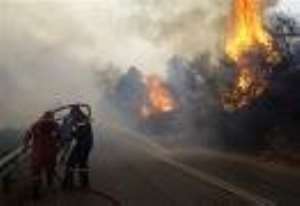
Greek firefighters are facing another day battling wildfires still threatening areas north of Athens. Thousands of residents of the capital's northern suburbs were forced to leave their homes as dozens of houses and large areas of forest were burnt.
But a Greek government spokesman said the immediate danger had passed and a BBC correspondent said many of the fires had now been put out.
Aircraft from several countries are dropping water on the fires.
The BBC's Malcolm Brabant in the area says planes are flying over constantly as they battle the remaining fires, and winds are not as powerful as they were on previous days.
But the scenery around the capital has been damaged and in places resembles a moonscape, our correspondent adds.
To the north, the town of Marathon, with important archaeological sites, was encircled by fires but appears to have been spared.
Reports say nuns had to be evacuated from an Orthodox monastery near the town of Nea Makri, north-east of Athens, as firemen fought to save the compound from encroaching fires.
More than 90 fires are thought to have started since Saturday and more than 37,000 acres of land have been burnt.
While no casualties have been reported, a regional Athens governor, Yiannis Sgouros, has called the fires an "ecological disaster".
Almost all of the approximately 10,000 inhabitants of Agios Stefanos, 23km (14 miles) north-east of Athens, fled on Sunday by vehicle or on foot.
But others refused to leave, carrying out a desperate defence of their homes with garden hoses, buckets, and shovels, the BBC's Dominic Hughes reports from Athens.
Overnight, the town of Marathon found itself threatened with flames reported to have raced down a hill, with ancient monuments and museums in danger, but this threat now appears to have passed.
One Athens resident told the BBC the fires were having a huge impact on the city.
"You can smell it, no matter how far away you drive. There's a thick cloud of smoke all over Athens," said Katerina Drakopoulos.
"The streets are packed. People have panicked, just trying to save their houses. It's been ridiculously windy."
The mayor of Marathon, Spyros Zagaris, said he had been "begging the government to send over planes and helicopters" to no avail.
But government spokesman Panos Livadas told the BBC things had improved since the extraordinarily difficult conditions of the first 24 hours of the fires, and praised the firefighting effort.
"Things are looking much better this morning," he said.
"The work [of the] firemen and firewomen has ... been extraordinary... - very efficient, they have done everything humanly possible and I think it's indicative of the efficiency of their work the fact that no human loss of life was there."
"Immediate dangers are over," he added.
At first light on Monday, water-dropping aircraft resumed operations, assisted by aircraft from France, and Italy. Strong winds are expected to resume by midday.
Nearly 2,000 firefighters, including a Cypriot contingent, and soldiers are engaging the blaze on the ground, together with hundreds of volunteers.
Multiple fires have been burning across an area some 50km wide, fanned by strong and unpredictable winds.
Dozens of homes were burnt down and a state of emergency was declared in the Athens area, which was shrouded in smoke.
The fires began late on Friday in Grammatiko, near Marathon. They are the worst since those in 2007 which killed about 70 people.
In July, dozens of fires burnt through thousands of hectares of land in other parts of Greece, Spain, France and Italy.
According to the conservation group Greenpeace, heat waves and drier conditions are leading to larger and more uncontrollable forest fires across the whole Mediterranean region.




 Ensure private schools employ professional teachers, not SHS graduates — Xandy K...
Ensure private schools employ professional teachers, not SHS graduates — Xandy K...
 Alan Kyeremanten was the brain behind Ghana Card not Bawumia — Hopeson Adorye
Alan Kyeremanten was the brain behind Ghana Card not Bawumia — Hopeson Adorye
 I'm not running for office for power prestige, I just want to solve Ghana’s prob...
I'm not running for office for power prestige, I just want to solve Ghana’s prob...
 Provide immediate assistance to our displaced residents — Oda Nkwanta residents ...
Provide immediate assistance to our displaced residents — Oda Nkwanta residents ...
 Send nurses abroad; it’s a better option than being unemployed in Ghana — NDC Pa...
Send nurses abroad; it’s a better option than being unemployed in Ghana — NDC Pa...
 Bawumia stole free tertiary education for Persons with Disabilities from NDC’s 2...
Bawumia stole free tertiary education for Persons with Disabilities from NDC’s 2...
 Ejisu by-election: Anger is bound to occur but return to your 'sweet home' — Nan...
Ejisu by-election: Anger is bound to occur but return to your 'sweet home' — Nan...
 Limited voters registration: Don't allow politicians to engage your minors for p...
Limited voters registration: Don't allow politicians to engage your minors for p...
 Ferry on Oti River breaks down; drivers and passengers stranded
Ferry on Oti River breaks down; drivers and passengers stranded
